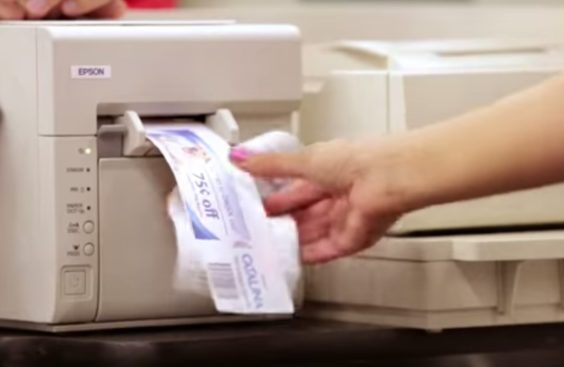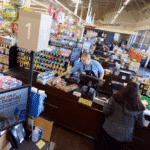It can be a nice surprise when a few coupons print out at the register when you’re checking out. But if you’re familiar with those checkout coupon machines and how they work, many of the coupons may not come as much of a surprise at all. The personalized patterns, and national promotions, can get predictable – if you buy this, you pretty much know you’re going to get a coupon for that.
But what if you never knew what you were going to get – and neither did the coupon issuers themselves? Then the checkout coupons that print at the register really will be a surprise, to everyone involved – and everyone may be better off because of it.
That’s the idea behind a proposed new-and-improved version of the checkout coupon machines that were originated by Catalina Marketing. A newly-published patent application by brand marketing company 12 Digit Marketing describes an alternate system in which manufacturers analyze what you buy, then compete for the right to provide you with a coupon for their products.
The coupons printed by the Catalina machines may seem somewhat random, but they’re actually anything but arbitrary. Catalina analyzes the bar code of each product that’s scanned while you’re checking out. The purchase of a particular product will trigger the Catalina printer to generate a specific coupon. Brands contract with Catalina for exclusive access to entire product categories, so the purchase of a product within that category will generate a coupon for their brand, and theirs alone.
But 12 Digit Marketing wants to blow up this exclusive system, and open the whole thing up to real-time competition.
General Mills, the company explains, might want to provide you with a $2 coupon off a 24-ounce box of Cheerios, if you buy a 16-ounce box. They can do that, by contracting with Catalina. But what if Kellogg would also like to give you a $3 coupon off its Corn Flakes brand, if you buy that same box of Cheerios? If General Mills is already contracted with Catalina, Kellogg is locked out.
Unless, that is, the two brands are allowed to battle it out.
12 Digit Marketing’s system would hold a “UPC auction”, in which manufacturers can bid for the right to have their coupon print out, after a particular product’s bar code is scanned at the register. Manufacturers can set a maximum amount they’re willing to pay, or they can change their bids – and even the value of the coupon – in real time. Whoever wins the auction earns the right to have their coupon print out at the register. Coupon bids and offers can also be tied to your purchase history.
And if you’re not into paper, the discounts can also be delivered digitally. Instead of printing at the register, coupons could be loaded onto your loyalty card, or accessible via an app. The patent application even envisions an app that would remind you of the coupons you have available, as you walk down the aisle where the relevant products are located.
For consumers, modern technology has “profoundly improved their lives and personalized their shopping experience online,” the application reads. “Unfortunately these advances haven’t progressed to the grocery store” – a problem that this invention aims to solve.
12 Digit Marketing says its idea is an improvement on the type of system run by Catalina – one that’s better for manufacturers and consumers alike. “Current coupon targeting solutions lock out certain manufacturers because coupons are sold on a category exclusive basis, causing many opportunities for coupon distribution to be lost,” the application declares. The new-and-improved version would be “capable of overcoming this challenge by providing an open, real-time marketplace available to all.”
And yet, it’s debatable whether putting checkout coupons up for bids will result in more recipients actually using them. If you’ve ever found Catalina coupons left behind at the register, strewn around the parking lot, or crumpled at the bottom of your purse, you know that many shoppers don’t bother with them. According to Inmar, only about 7% of all checkout coupons are ever redeemed.
So would manufacturers be willing to put in the effort that participating in such a system would require? The idea of real-time bidding evokes images of brand employees sitting in front of banks of computer screens, monitoring purchase data from millions of supermarket scanners, and placing bids as though they’re day-trading stocks – all for the right to have a little machine spit out a coupon that 93% of recipients won’t bother to use.
There’s no indication yet when and whether the idea might become reality, providing Catalina with some competition at the checkout. But if it results in more manufacturers competing for your attention, with better, more relevant and more targeted coupons – a little competition might turn out to be beneficial for everyone. Except maybe Catalina.
Image source: Catalina















Nice rant AC. But yeah
Always amusing when a vendor announces its plans to “disrupt the industry,” and then reveals a complete lack of understanding of said industry.
For starters, category exclusivity is a feature – not a bug – with these types of programs. (especially in “Coke/Pepsi” categories, where 2 brands battle with a zero-sum mindset) FSI publishers also do this: “national” coupon events (35MM+) lock out the category on that particular Sunday.
With some tweaks to the positioning, I can see how the “UPC auction” approach has value: it’s for the little guys, challenger brands that can *never* hope to compete with their category leaders. In the same way that paid search and real-time-bidding opened up online display inventory for smaller, savvy, agile players.
But this feels like an API, not a separate platform with its own hardware & consumables. Ever tried to sell into a retailer? How ’bout all of them? (and then turn around & convince MFRs to give you content / work the auction) The scale of what Catalina has been able to accomplish here – basically creating the entire “register receipt” method, and owning it – is nothing to sneeze out.
Realistically, the best 12 Digit Marketing can hope for is to develop enough IP to be acquired by one of the 4-5 players in the space. (which ain’t bad) But this will *never* exist as a standalone platform. At least, not in my lifetime.
Sorry to be the wet blanket. But this industry is already loaded with vision sellers and navel-gazers. We need realists; strategists who understand, on a practical level, how & why Catalina / NAM / VAL / Cellfire / YouTech / Quotient / do what they do.